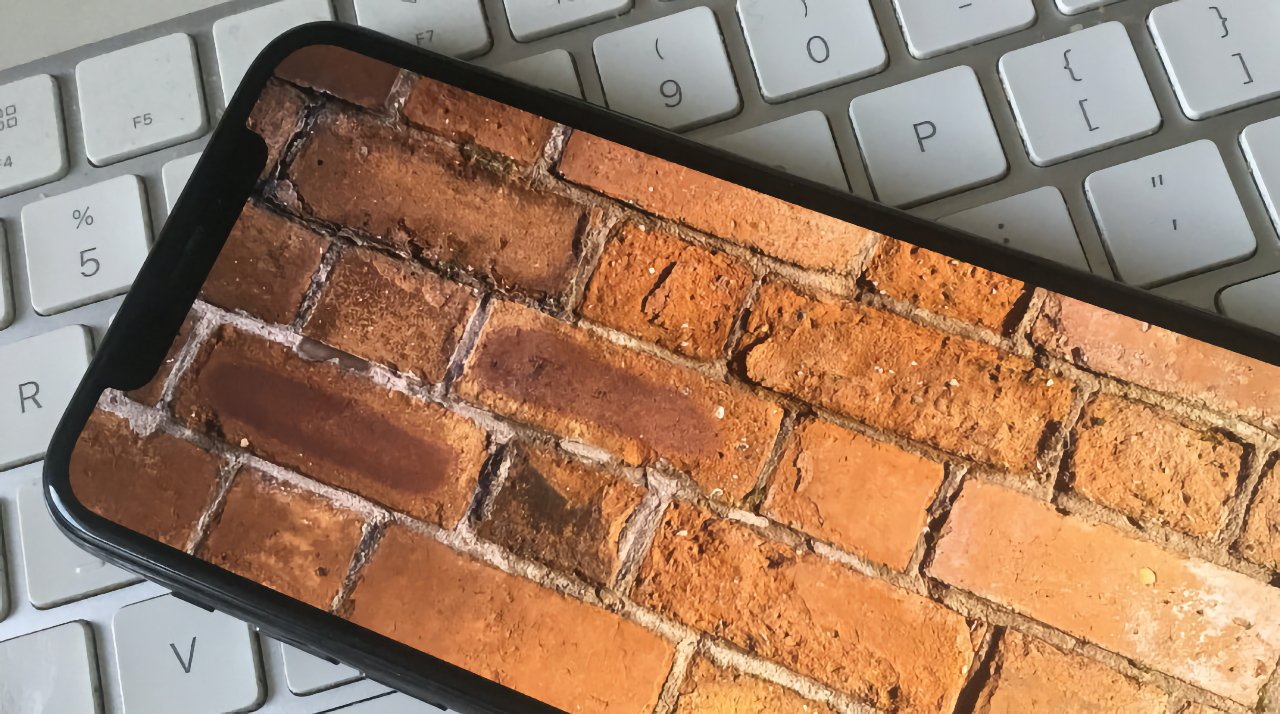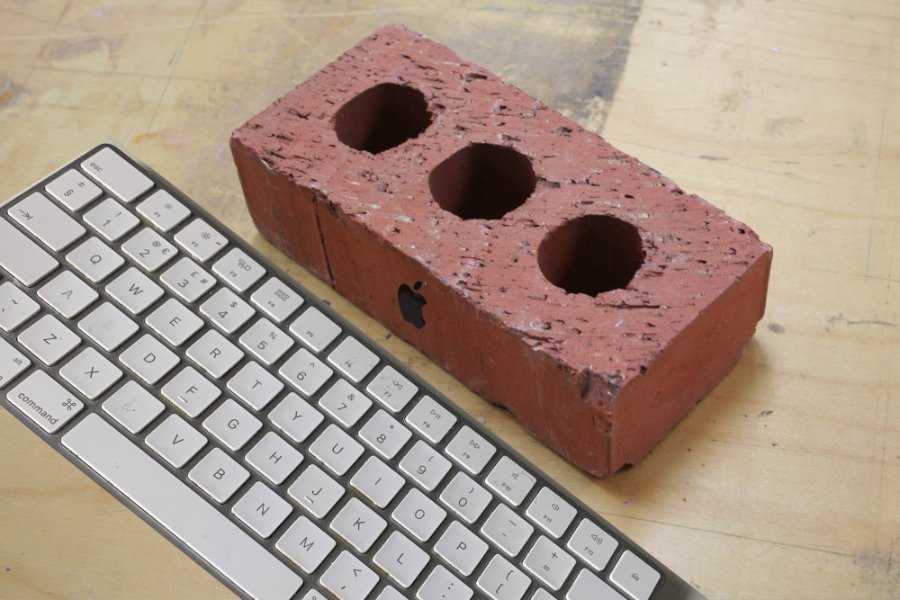Don't install Apple's new betas -- let others risk their devices
Every year Apple releases beta test versions of its newest software, and every year people lose data, time, and money to it. If you value any of those, wait.

Really bricking your iPhone doesn't look this good.
You may have been lucky so far, but this is beta roulette -- at some point, you're going to have a problem. The thing is, it's potentially such a big problem that when it happens, at the best, you lose time.
More severely, you can lose data. And, in extreme situations, you can stop your device from working at all.
Completely bricking your device is fortunately very rare. The trouble is that you have no way to figure the odds of any of the three scenarios happening.
It's not worth installing the new beta iOS, iPadOS, macOS, watchOS, tvOS, or visionOS, even though it will be enticing. All of them will have compelling new features -- well, except perhaps tvOS -- but you can use and enjoy them when Apple officially releases it all in a few months' time.
Even then, if you rely on your devices to make money, you'd be better off waiting a little while before installing them. But while they're in beta, you are putting your devices and data at risk.
According to Bloomberg, and things we've heard ourselves, things look worse this year.
My sense is that many of the features in the first iOS 18 beta have come in really hot and this first seed is going to be especially buggy. In fact, some are surprised the first betas are going out tomorrow. As I've said, the AI features will be a beta - even at launch in fall.
-- Mark Gurman (@markgurman)
It's probably not consoling that reporting lost data or incredibly hard crashes on your iPhone helped other devices to live. But that is literally the main reason that there is a beta release at all.
True, developers do need the new versions to test against their apps, but otherwise this is Apple exposing the new OSes to more users and in more situations than they could ever test internally.
AppleInsider staff can promise you that when severe problems happen because of the betas, it doesn't feel like that. Your expensive device, the device you rely on every day, chewing on your data or not working at all is time-consuming.
And, time you've spent recovering that device is time you're not making money, or spending it on things you want to spend it on.
Collateral damage
There is always the chance that your device and data are going to be fine. The new OSes will have gone through alpha testing inside Apple, after all.
You could very well be lucky and be one of the people whose devices are not impacted, and have a very smooth experience.
Since there is no way to know that's the course things are going to take without risking your device, it is truly not worth it. Maybe you'll get lucky again, who knows.
But that's the problem. You don't know if things are going to go well or poorly. Last year's experience, or 10 years ago's install, aren't any indicator of success now.
That business of developers getting early access is not because they have devices to spare. It's not even so that developers can add in new features to take advantage of whatever improvements Apple has offered.
At this stage of the game, it's more so that developers can ensure that their apps still work on the latest version. Very many will not.

It may be completely unusable, but it's got great new macOS features
At the extreme, some apps may not launch. Any app can have a feature that suddenly stops working.
It could be that the developer just has to do something impossibly tiny to make it all work again, but until they release an update, you're stuck without a feature you rely on to make your money every day.
Developers who've been through this before also know that if the first beta breaks a feature of theirs, a second beta could break whatever fix they do. So at least some developers will wait for weeks or months into the beta test before they release an update.
Others will be working on updates but not release them until Apple does the final, public version.
Then when you've waited through the months of beta updates all the way up to the time when Apple starts pre-installing the new version on devices, other app developers will wait even longer.
That's because while the beta exposes Apple's new software to many more people than it could ever get in an internal test, that's still a tiny proportion compared to the number of people who use and rely on these OSes. Once they come out of beta and become the official public release, millions upon millions more people will use them -- and they will find more bugs.
This all sounds as if Apple releases badly-made software, and sometimes it does. But nobody at Apple will thank you for sacrificing your devices to find out. You're not going to get a check if all your Contacts are wiped out, or Photos eats every single one of your pictures going back over a decade and then propagates that to iCloud, which then in turn wipes them all out, everywhere.
In the coming days, weeks, and months, you are going to be able to read about every detail of the new OSes -- and their bugs -- on AppleInsider. But this is not a case of do as we say, not as we do.
Instead, it's a case of every team member having a spare device explicitly for testing. It's a case of dedicated hardware for beta testing, and no one is going to let the betas near their main work devices.
And in most cases, we're not letting it near our main iCloud account either.
We're not the only ones saying this. Apple says it too on that license most click through without reading.
So, if you don't listen to us, that's fine. Listen to the folks that made the betas instead when they say that if you value your devices and time, or use your machine for your day-to-day, wait. It's just not worth the potential for disaster.
Read on AppleInsider

Comments
There have been beta 1s that have bricked devices... I had one, a MacBook 12-inch 2017, warped hard... iCloud got all jacked on the device couldn't repair for nothing the backup etc, had to reformat and reinstall which was such a pain back then tho, cause of the one port; now wasn't an absolute brick but it was scary that my iCloud was gonna get screwed...
I am gonna wait till ßeta2...
my 2¢
So yeah, it happens. And when it happens, it can get bad.
We've gotten some pushback on social about this, from folks that really have no business running the betas as they have nothing to test, and won't report back to Apple. We've even had some here already complaining that they know this already, and why should they have to be told it again.
I know most of the posters here understand that this software is for testing and not for daily use. There are scores of people who don’t understand what beta means and brick their phones and end up going to see my friends at the Apple Store.
They are sometimes upset that their phone did that and the technician has to explain to the customer what beta means. The worst thing is some customers yell that Apple shouldn’t have let them do that. 🙄
Having a separate iCloud account isn’t as bad as it once was because you can take advantage of Family Sharing and make the new account part of your family so you’ll still have the ability to install apps that support Family Sharing on the machine.
I’ve never bricked an Apple device but I have bricked other devices, mostly during system firmware updates but sometimes at random. Over the years device manufacturers have learned to squirrel away a copy of the previous system firmware or factory installed firmware on the device that will get reinstated when doing a factory reset. Earlier devices didn’t always have enough onboard EEPROM or flash memory to keep a recovery image onboard during system firmware upgrades. A good example is some fairly recent LG soundbar wireless subwoofers. They get totally bricked seemingly at random and can only be restored by reprogramming the EEPROM chip on an EEPROM programmer. There is at least one person who offers this reprogramming as a service, but shipping a heavy subwoofer back and forth is not always a good deal, especially if it’s a lower end device and with no guarantee that it won’t happen again.
Apple’s firmware update process has been amazingly reliable for as long as I’ve been using Apple devices. Intel finally got their firmware and driver update process to a very reliable state with their NUCs, so I hope Asus continues to maintain it appropriately.